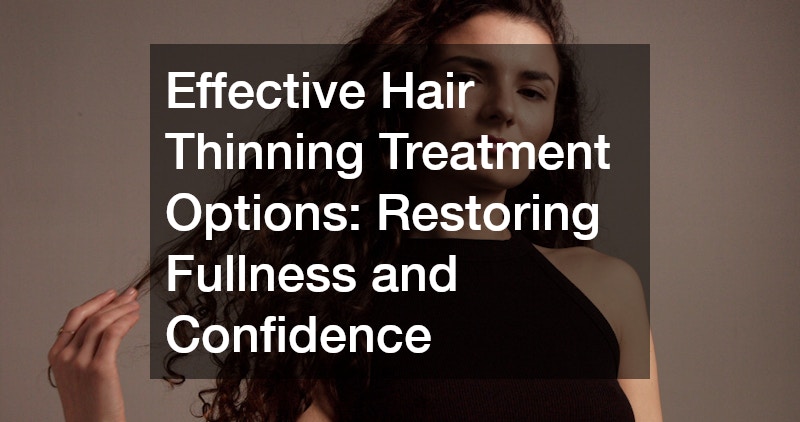
Having thick, voluminous hair is often associated with beauty, youth, and confidence. For many, a full head of hair represents vitality and health. However, hair thinning and loss can occur for a variety of reasons, including genetics, hormonal changes, stress, and poor nutrition, leaving many individuals frustrated and insecure about their appearance. As hair thinning progresses, it can significantly impact one's self-esteem and even affect social and professional interactions. The good news is that there are a variety of effective hair thinning treatments available today that can help combat thinning hair and restore its fullness. From medical treatments like minoxidil and finasteride to natural remedies such as essential oils and dietary adjustments, there are solutions tailored to meet individual needs.
Video Source
Additionally, advances in hair restoration techniques, including hair transplants and laser therapy, have given people new hope for regaining their desired hair volume. Whether you're looking for non-invasive treatments or more permanent solutions, addressing hair thinning early on can make a significant difference in achieving the results you desire. By exploring your options, you can regain your confidence and enjoy a fuller, healthier head of hair.
When it comes to hair thinning treatment, it's important to first understand the underlying causes. Hair thinning can be caused by a variety of factors, including genetics, hormonal imbalances, and stress. By identifying the root cause of your hair thinning, you can better tailor your treatment plan to address the issue effectively.
One common hair thinning treatment option is minoxidil, which is a topical solution that can help stimulate hair growth and increase hair density. Another popular treatment is finasteride, which works by blocking the hormone dihydrotestosterone (DHT) that is responsible for hair loss. Additionally, hair transplants are a more permanent solution for restoring fullness to thinning areas.
It's important to consult with a dermatologist or hair specialist to determine the best hair thinning treatment option for your unique needs. They can provide personalized recommendations based on your specific hair type, condition, and goals.
For those looking for non-surgical hair thinning treatment options, there are several effective choices available. Platelet-rich plasma (PRP) therapy is a popular treatment that involves injecting concentrated platelets from your blood into the scalp to stimulate hair growth. This process encourages natural regeneration and strengthens hair follicles. Laser therapy is another non-invasive option that uses low-level laser light to promote hair follicle health and growth, improving overall hair thickness and quality.
Scalp micro pigmentation is a cosmetic procedure that uses specialized pigments to create the illusion of fuller hair by mimicking the appearance of hair follicles. This treatment is particularly effective for those with advanced hair thinning or balding, offering an immediate and realistic aesthetic improvement. Hair thickening shampoos and supplements are also available as non-surgical options to improve hair health and thickness, providing a more accessible alternative for daily care.
While non-surgical hair thinning treatments may not provide permanent results, they can be an effective way to boost hair density and confidence without undergoing surgery. These treatments are generally safe and well-tolerated, with minimal side effects. By exploring these non-invasive options, individuals can find the solution that best fits their needs and lifestyle, helping them maintain a fuller and more vibrant appearance.
In addition to medical treatments, making lifestyle changes can also help improve hair thinning. Eating a balanced diet rich in vitamins and minerals essential for hair health, such as biotin, iron, and zinc, can promote healthy hair growth. Managing stress through relaxation techniques or therapy can also reduce hair loss caused by stress-related factors.
Avoiding harsh hair treatments, such as excessive heat styling or chemical processing, can prevent further damage to already thinning hair. Regular scalp massages can improve blood circulation to the follicles and promote hair growth. Incorporating these lifestyle changes into your routine can complement medical treatments for more effective results.
Remember, it's important to be patient and consistent with your chosen hair thinning treatment plan. Results may take time to become noticeable, so it's essential to stick with your treatment regimen and follow your healthcare provider's recommendations closely.
Dealing with hair thinning can be a challenging experience, but there are effective treatment options available to help restore fullness and confidence. Whether you opt for surgical or non-surgical treatments, or make lifestyle changes to support healthy hair growth, there are ways to address hair thinning and regain your confidence. By consulting with a healthcare provider and developing a personalized treatment plan, you can take the first step towards achieving thicker, fuller hair.
.